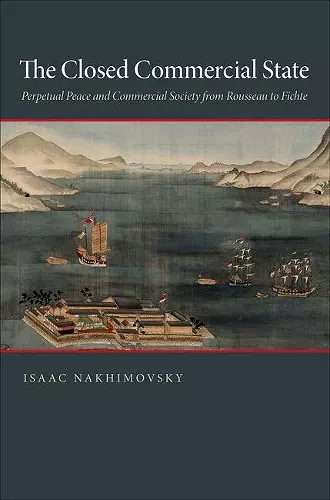The Closed Commercial State
Perpetual Peace and Commercial Society from Rousseau to Fichte
Format:Hardback
Publisher:Princeton University Press
Published:8th Jul '11
Currently unavailable, and unfortunately no date known when it will be back

This book presents an important new account of Johann Gottlieb Fichte's Closed Commercial State, a major early nineteenth-century development of Rousseau and Kant's political thought. Isaac Nakhimovsky shows how Fichte reformulated Rousseau's constitutional politics and radicalized the economic implications of Kant's social contract theory with his defense of the right to work. Nakhimovsky argues that Fichte's sequel to Rousseau and Kant's writings on perpetual peace represents a pivotal moment in the intellectual history of the pacification of the West. Fichte claimed that Europe could not transform itself into a peaceful federation of constitutional republics unless economic life could be disentangled from the competitive dynamics of relations between states, and he asserted that this disentanglement required transitioning to a planned and largely self-sufficient national economy, made possible by a radical monetary policy. Fichte's ideas have resurfaced with nearly every crisis of globalization from the Napoleonic wars to the present, and his book remains a uniquely systematic and complete discussion of what John Maynard Keynes later termed "national self-sufficiency." Fichte's provocative contribution to the social contract tradition reminds us, Nakhimovsky concludes, that the combination of a liberal theory of the state with an open economy and international system is a much more contingent and precarious outcome than many recent theorists have tended to assume.
"Nakhimovsky's book is rewarding to read. Not only does it give a rich, vivid description of the issues and contending forces at a time when the future of the European nation-state system hung in the balance; it also calls into question some pervasive assumptions about the rise of capitalism."--Michael Rosen, The Nation "The [book] is a fascinating and always judicious account of a world of argument over whether and how European states could pursue economic vitality without destroying themselves and the rest of the world in the process... Nakhimovsky's lucid and engaging book is an invaluable contribution to that project, as well as to the broader study of the history of political and international thought and the contemporary resonances of historical debates."--Jennifer Pitts, Perspectives on Politics "As Nakhimovsky has brilliantly demonstrated, there is much for contemporary readers to be inspired by in Fichte's basic intuition that policies of public finance might be used not merely to regulate local economies and promote world peace but also to realize a robust and demanding conception of justice."--Frederick Neuhouser, Notre Dame Philosophical Reviews
ISBN: 9780691148946
Dimensions: unknown
Weight: 454g
216 pages